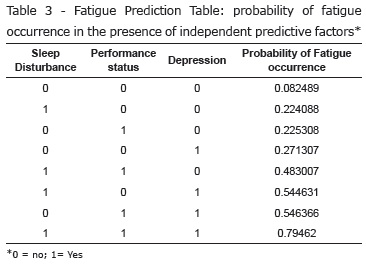This study identified the prevalence and predictors of fatigue in colorectal cancer (CRC) patients. Cross-sectional study with 157 adult CRC outpatients (age 60±11.7 years; 54% male; cancer stage IV 44.8%). The Piper Fatigue Scale-revised was used to assess fatigue scores. Socio-demographic, clinical, depression, performance status, pain and sleep disturbance data were assessed. Associations between fatigue and these data were analyzed through logistic regression models. Fatigue was reported by 26.8% patients. Logistic regression identified three predictors: depression (OR: 4.2; 95%CI 1.68-10.39), performance status (OR: 3.2; 95%CI 1.37-7.51) and sleep disturbance (OR: 3.2; 95%CI 1.30-8.09). When all predictors were present, the probability of fatigue occurrence was 80%; when none were present, the probability was 8%. The model's specificity and sensitivity were 81.9% and 58.6%, respectively. Through the assessment of depression, performance status and sleep disturbance, the probability of fatigue occurrence can be estimated, and preventive and treatment strategies can be rapidly implemented in clinical practice.
Colorectal Neoplasms; Odds Ratio; Regression Analysis; Risk Factors; Signs and Symptoms



